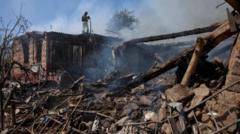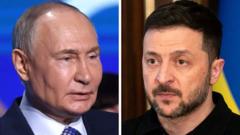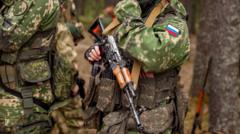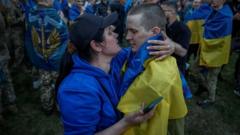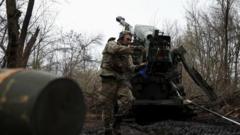As tensions loom in Ukraine, the anticipated diplomatic talks aimed at achieving a cease-fire are abruptly downgraded, leaving many skeptical about their effectiveness and the future of peace efforts.
Diplomatic Efforts for Ukraine Cease-Fire Encounter Setbacks Amid High-Level Withdrawals

Diplomatic Efforts for Ukraine Cease-Fire Encounter Setbacks Amid High-Level Withdrawals
Planned high-level cease-fire discussions in London face challenges after key officials withdraw, stalling potential progress.
Britain's anticipated high-level meetings on the Ukraine conflict have been significantly reduced following the withdrawal of Secretary of State Marco Rubio. This unexpected shift, as communicated by European officials on Tuesday, also led to British Foreign Secretary David Lammy opting out of the discussions. Although lower-level talks involving diplomats from Britain, France, Germany, Ukraine, and the United States are still set to occur, the downgrade of what was once planned as a major diplomatic event raises concerns regarding the viability of cease-fire negotiations.
The upcoming meetings are expected to cover details of a proposed peace plan from the Trump administration, which stipulates conditions such as Ukraine's acceptance of Russia's annexation of Crimea and a ban on NATO membership. President Volodymyr Zelensky has firmly rejected these demands, arguing they contradict Ukraine’s constitution.
The decision to pull back the meeting was reportedly made during a conversation between Rubio and Lammy, leading both to the conclusion that further technical discussions were necessary prior to reconvening at a ministerial level. Rubio had previously expressed concern that without timely advancement, President Trump might refocus his attention elsewhere. Initially citing “logistical issues” for his absence, Rubio later appointed Keith Kellogg, the special envoy to Ukraine and Russia, to represent the U.S. at the talks.
Responding to this development, Lammy emphasized the need for ongoing dialogues, asserting that this moment is critical for Ukraine, Britain, and Euro-Atlantic security. He is still set to engage independently with Ukraine's Foreign Minister Andrii Sybiha, while British Defense Secretary John Healey will meet with his Ukrainian counterpart, indicating at least some diplomatic engagement will continue despite the high-level withdrawals.
The upcoming meetings are expected to cover details of a proposed peace plan from the Trump administration, which stipulates conditions such as Ukraine's acceptance of Russia's annexation of Crimea and a ban on NATO membership. President Volodymyr Zelensky has firmly rejected these demands, arguing they contradict Ukraine’s constitution.
The decision to pull back the meeting was reportedly made during a conversation between Rubio and Lammy, leading both to the conclusion that further technical discussions were necessary prior to reconvening at a ministerial level. Rubio had previously expressed concern that without timely advancement, President Trump might refocus his attention elsewhere. Initially citing “logistical issues” for his absence, Rubio later appointed Keith Kellogg, the special envoy to Ukraine and Russia, to represent the U.S. at the talks.
Responding to this development, Lammy emphasized the need for ongoing dialogues, asserting that this moment is critical for Ukraine, Britain, and Euro-Atlantic security. He is still set to engage independently with Ukraine's Foreign Minister Andrii Sybiha, while British Defense Secretary John Healey will meet with his Ukrainian counterpart, indicating at least some diplomatic engagement will continue despite the high-level withdrawals.


